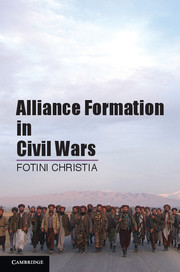Book contents
- Frontmatter
- Contents
- Figures
- Tables
- Maps
- Acknowledgments
- Introduction
- PART I CONTEXT AND THEORY
- 1 Literature and Research Design
- 2 A Theory of Warring Group Alliances and Fractionalization in Multiparty Civil Wars
- PART II AFGHANISTAN
- PART III BOSNIA AND HERZEGOVINA
- PART IV FURTHER EXTENSIONS
- Note on Sources
- Appendix
- References
- Index
1 - Literature and Research Design
Published online by Cambridge University Press: 05 December 2012
- Frontmatter
- Contents
- Figures
- Tables
- Maps
- Acknowledgments
- Introduction
- PART I CONTEXT AND THEORY
- 1 Literature and Research Design
- 2 A Theory of Warring Group Alliances and Fractionalization in Multiparty Civil Wars
- PART II AFGHANISTAN
- PART III BOSNIA AND HERZEGOVINA
- PART IV FURTHER EXTENSIONS
- Note on Sources
- Appendix
- References
- Index
Summary
Afghanistan, ethnically fractionalized and at war for much of the past thirty years, is a prime example of pernicious multiparty conflict. But it is hardly alone. The world is comprised of multiethnic states, more than half of which have three or more ethnic groups – often caught up in disputes. It is thus striking to note the lack of a systematic theory on alliance formation and group fractionalization in civil wars, a gap that this book attempts to address. Although no work in the existing literature specifically theorizes the causes of such alliance shifts and the interlinked group fractionalization dynamics, a variety of works in international relations, political economy, and comparative politics have substantial bearing on these questions. Collectively, this diverse literature explains the within-conflict processes at hand as a result of power dynamics, identity politics, both, or neither. I outline these hypotheses and the literature supporting them as a way to motivate the discussion, later on in this chapter, of the research design and data I used to build and then test the proposed theory of civil war alliances and group fractionalization. This theory is then presented in Chapter 2.
Relevant Literature
Several prominent political science theories, most of them not directly concerned with intrastate conflict, suggest that power considerations should motivate warring groups’ behavior in multiparty civil wars. The first of these theories is the neorealist paradigm of international relations, which argues that alliances tend to be power-balancing – actors choose to balance against their most powerful rivals. A modified version of this theory suggests that weaker actors balance against the most powerful actor only if that most powerful actor is perceived as threatening, which itself is a function of offensive power, aggregate power, geographic proximity, and perceived aggressive intentions. Neither variant of neorealist theory sees bandwagoning – siding with the stronger power at the expense of the weaker one – as an optimal option in general, although it has been argued that bandwagoning can be a preferable alliance strategy if the objective is profit rather than security. Bandwagoning is also more likely, according to the literature, when an actor is particularly weak, proximate to a strong power, or when it recognizes that defeat in an ongoing war is imminent.
- Type
- Chapter
- Information
- Alliance Formation in Civil Wars , pp. 19 - 31Publisher: Cambridge University PressPrint publication year: 2012



